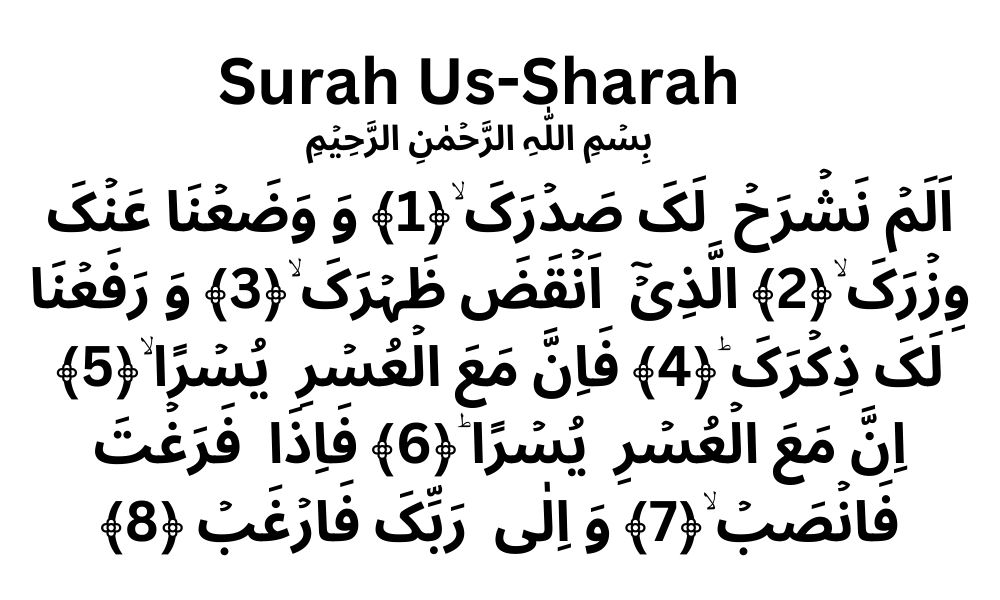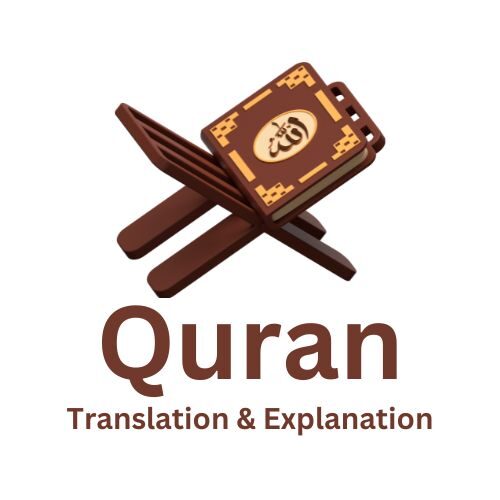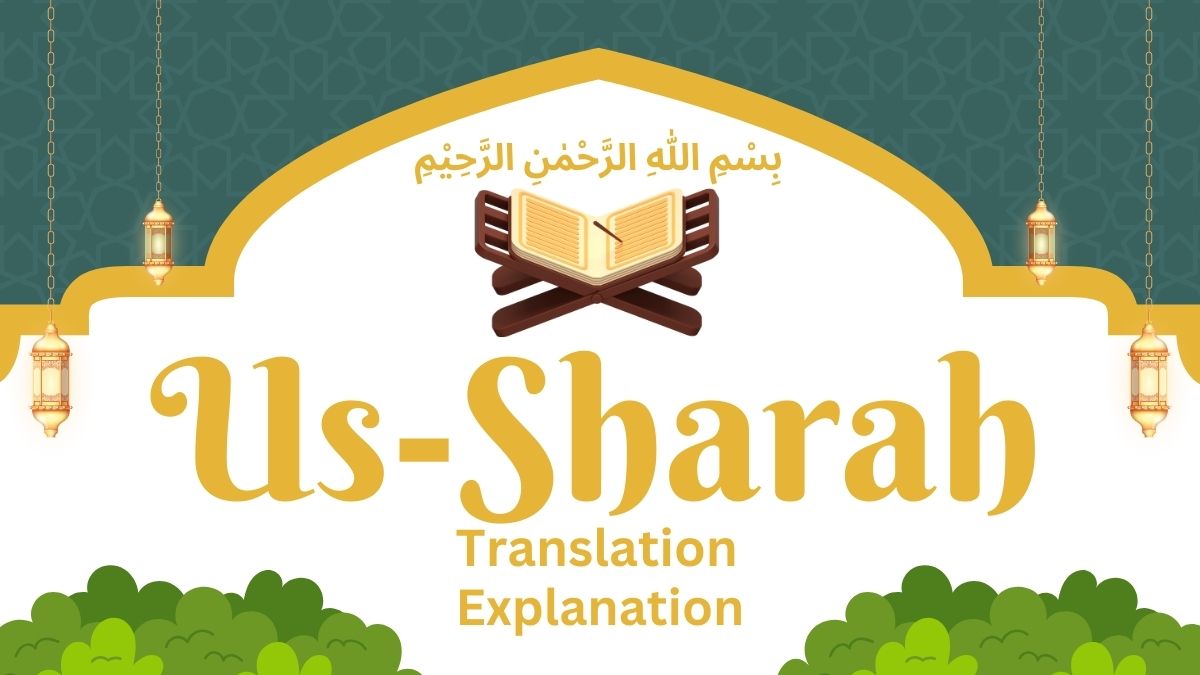Surah Us-Sharah Chapter:94 Arabic

Table of Contents
Surah Us-Sharah Chapter:94 Translation
- O Prophet! Have we not opened your chest? (That is, he did not completely satisfy all kinds of mental confusion and anxiety by completely removing it and did not give the courage to stand up to clash with the whole world for the sake of truth).
- And he took on the responsibility, lifting a heavy burden from your shoulders.
- Who was breaking your back (That is, he removed the grief, worry and worry of yours which you had on the extreme persecution of your nation, ignorance, immorality and immorality).
- And raised the mention of you. (That is, he raised your name, made it famous and gave him great honor and fame forever).
- There really is difficulty as well as ease.
- And it is really easy with difficulty. (That is, the one who suffers difficulties will find ease and comfort later).
- When you are free, engage in (worship) labor.
- And (then) tempt to go back to your nurturing master.
Surah Us-Sharah Explanation
Surah Us-Sharah Chapter:94 Verse 1 Explanation
To start the discussion with this question, and then the following theme, indicates that the Messenger (peace be upon him) was deeply troubled and distressed by the significant challenges. In those trying times, Allah addressed him with words of comfort, saying: O Prophet, have We not granted you such and such blessings? So why do you feel so troubled by these initial hardships? A closer look at the context in which the term sharh-sadr (opening of the breast) appears in the Quran reveals two meanings.
(1) In Surah Al-Anaam, Ayat 125, it states: So whomever Allah wills to guide aright, He opens his breast to Islam (yashrah sadrahu lil-lslam); and in Surah Az-Zumar, Ayat 22: Can the person whose breast Allah has opened for Islam (sharahullahu sadrahu lil-Islam) walk in the light shown by his Lord? In both instances, sharh-sadr signifies freeing oneself from distractions and doubts, embracing Islam as the sole true way of life, and accepting the beliefs, moral principles, and religious teachings that Islam offers as right and valid.
In Surah Ash-Shuara, Ayats 12-13, When Allah appointed the Prophet Moses (peace be upon him) to the significant role of Prophethood and instructed him to confront Pharaoh and his powerful empire, he expressed his concerns: “My Lord, I fear they will consider me a liar, and my heart feels constricted.” In Surah Ta Ha, Ayats 25-26, it is mentioned that at this moment, the Prophet Moses (peace be upon him) pleaded with Allah, saying: “Lord, expand my chest for me (Rabbishrahli sadri) and ease my task.”
The constriction of the heart signifies the immense burden of the responsibilities of Prophethood and the daunting challenge of facing a formidable and tyrannical force of disbelief alone. The phrase “sharh-sadr” indicates a desire for his spirits to be lifted, enabling him to take on any difficult task without hesitation, thus gaining the strength and courage necessary to fulfill the great responsibilities of Prophethood. A closer look at this verse reveals that the “opening of the Prophet’s (peace be upon him) breast” encompasses both interpretations.
The first interpretation suggests that prior to his Prophethood, the Prophet (peace be upon him) viewed the beliefs of the polytheistic Arabs, Christians, Jews, and fire worshippers as false, and he was not even content with the hanifiyyat practiced by some Arab monotheists, as it was an unclear doctrine lacking the specifics of the true path. However, since he was unsure of the right path, he experienced mental confusion and distraction. With the blessing of Prophethood, Allah alleviated his mental turmoil and illuminated the path of true guidance, granting him complete peace of mind.
In another sense, this indicates that along with the blessing of Prophethood, Allah endowed him with the courage, determination, and open-mindedness necessary to bear the heavy responsibilities of such a significant role. He became the custodian of profound knowledge that no other human could fully grasp. He was granted wisdom capable of addressing any evil, no matter how severe or widespread. He developed the ability to stand firm without any material support or worldly power, serving as the standard-bearer of Islam in a society steeped in ignorance and barbarism.
He faced any hostility without hesitation and patiently endured all the challenges and hardships along the way, ensuring that no force could sway him from his position and beliefs. The verse emphasizes the idea that when Allah has granted you, O Prophet, the precious gift of sharh-sadr, there is no reason for you to feel troubled or disheartened by the challenges you face at the beginning of your mission.
However, it’s important to note that the validity of that miracle relies solely on Hadith, and it is not appropriate to derive it from the Quran. In Arabic, sharh-sadr cannot be equated with shaqq-sadr. Allama Alusi, in his work Ruh al-Maani, states that it is considered weak by researchers to equate sharh-sadr with shaqq-sadr.
Surah Us-Sharah Chapter:94 Verse 3 Explanation
Some commentators have suggested that prior to his Prophethood, during the period of ignorance, the Prophet (peace be upon him) may have made certain mistakes that left him feeling troubled. They interpret the verse as Allah comforting him by assuring him that those mistakes were forgiven. However, we believe this interpretation is fundamentally flawed. Firstly, the term “vizr” does not exclusively refer to sin; it can also denote a heavy burden.
Thus, it should not always be understood negatively. Secondly, the Prophet’s (peace be upon him) life before receiving revelation was so exemplary that it was presented in the Quran as a challenge to his adversaries. He even pointed out to the disbelievers, “I have lived among you for a lifetime before this Quran was revealed” (Surah Younus, Ayat 16). Moreover, he was not the kind of person to commit sins in secret. If he had been, Allah would have known and would not have commanded him to openly declare what He revealed in the aforementioned verse of Surah Younus, especially if he bore the stain of a hidden sin.
In this verse, “vizr” refers to a heavy burden, symbolizing the distress, anguish, and anxiety that weighed heavily on the Prophet’s sensitive nature as he witnessed his nation deeply entrenched in ignorance and barbarism. Idolatry was rampant, with the community immersed in polytheistic customs and practices. Immorality and indecency were widespread, wickedness and corruption flourished, and the powerful oppressed the powerless. Girls were buried alive, tribes launched surprise attacks on one another, and vengeance-fueled wars could last for a century.
Life, property, and honor were only secure for those with strong allies. This situation deeply troubled the Prophet (peace be upon him), and he felt helpless in finding a solution. However, Allah guided him, lifting this burden from his shoulders. Upon being appointed as a Prophet, he realized that belief in the principles of Tauhid, the Hereafter, and Prophethood was the key to eradicating corruption in human life and opening the path to reform in every aspect. This divine guidance reassured him that he could address the ailments of Arabia and extend his mission to all of humanity beyond its borders.
Surah Us-Sharah Chapter:94 Verse 4 Explanation
This was said at a time when no one could imagine how the fame of one unique individual, who had only a handful of followers in the city of Makkah, would eventually spread across the world and the high status he would achieve. Yet, Allah Almighty provided His Messenger (peace be upon him) with this good news under those very circumstances and fulfilled it in an unexpected manner. Initially, he assigned the task of elevating his reputation to his own adversaries. One tactic the disbelievers of Makkah employed to undermine his mission was during the Hajj season when pilgrims from all over Arabia flocked to their city.
They would approach these pilgrims at their camps and warn them about a dangerous man named Muhammad (peace be upon him), claiming that he cast such a spell on people that it caused fathers to be estranged from sons, brothers from brothers, and husbands from wives; thus, they should steer clear of him. They repeated this warning to all visitors to Makkah, whether for pilgrimage or other business.
Ironically, while they aimed to tarnish the Prophet’s (peace be upon him) image, their efforts only served to spread his name throughout Arabia, pulling him out of his isolation in Makkah and introducing him to various tribes across the land. Naturally, this piqued people’s curiosity about who this man was, what he preached, his character, and the nature of the influence he had on those around him.
When they learned about the Prophet’s (peace be upon him) morals, character, and conduct, and when they heard the Quran and understood its teachings, they noticed how different the lives of those influenced by what was labeled as magic had become compared to the lives of ordinary Arabs. This shift in perception led to a transformation of the Prophet’s reputation from a bad name to a good one. By the time the Hijrah occurred, it seemed that no tribe in Arabia was untouched; at least one person or clan from each had accepted Islam.
This marked the first stage of his rising renown. Following the Hijrah, the second stage began, during which the hypocrites, Jews, and prominent polytheists of Arabia were actively trying to defame him. Meanwhile, the Islamic State of Al-Madinah was showcasing a practical model of worship, God-consciousness, piety, moral purity, community life, justice, equity, generosity from the wealthy, care for the poor, and integrity in dealings, which was winning over hearts.
The enemies attempted to thwart the growing influence of the Prophet (peace be upon him) through war, but the believers, who had been trained and nurtured under his leadership, demonstrated their superiority through discipline, bravery, and a fearless attitude towards death. They adhered to moral principles even in the heat of battle, compelling all of Arabia to acknowledge them as a formidable force. Within a decade, the Prophet’s (peace be upon him) reputation soared to such heights that the very land where his adversaries had tried to tarnish his name echoed with the declaration of Ash hadu anna Muhammad ar-Rasul Allah.
This marked the beginning of the third phase with the establishment of the righteous Caliphate, during which his holy name began to be celebrated and honored across the globe. This tradition persists to this day and will continue until the Day of Resurrection, if Allah wills. In every corner of the world where Muslims reside, the message of Muhammad’s (peace be upon him) apostleship is proclaimed loudly in the call to Prayer five times daily, blessings are invoked upon him during prayers, and his sacred memory is honored in Friday Sermons.
There is not a moment throughout the year, day or night, when the Prophet’s (peace be upon him) name is not being mentioned somewhere in the world. This serves as clear evidence of the truth of the Quran, which proclaimed in the early days of Prophethood, wa rafana laka dhikrak, revealing the immense honor and recognition that the Prophet’s (peace be upon him) name would ultimately achieve.
In a Hadith, Abu Saeed Khudri reported that the Prophet (peace be upon him) said: Gabriel came to me and conveyed a message from My Lord and your Lord, asking how I have exalted Your renown. I replied: Allah alone has the best knowledge. Gabriel then said, Allah states: Whenever My name is mentioned, you will also be mentioned alongside Me. (Ibn Jarir, Ibn Abi Hatim, Musnad Abu Yala, Ibn al-Mundhir, Ibn Hibban, Ibn Marduyah, Abu Nuaim). The entirety of later history bears witness that this prediction has indeed come true.
Surah Us-Sharah Chapter:94 Verse 6 Explanation
This has been repeated twice to reassure the Prophet (peace be upon him) that the difficult times he was experiencing would not last forever, but would soon be followed by better days. At first glance, it may seem contradictory that hardship can coexist with ease, as these two states typically do not happen together. However, the phrase “hardship with ease” suggests that the period of ease is imminent, almost as if it accompanies the hardship itself.
Surah Us-Sharah Chapter:94 Verse 8 Explanation
When you find yourself free from other responsibilities be it those related to sharing the divine message, teaching and guiding new converts, or even everyday domestic tasks the commandment suggests that you should devote that time to the praise of Allah. Focus all your attention solely on your Lord during these moments of leisure.
Read Surah Al-Aadiyaat Click Here.


1 thought on “Surah Us-Sharah Chapter:94”